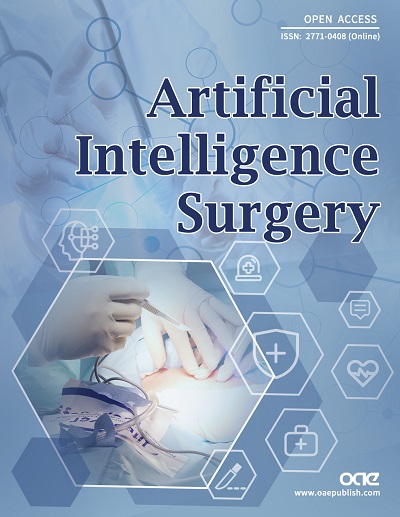REFERENCES
1. Alkire BC, Raykar NP, Shrime MG, et al. Global access to surgical care: a modelling study. Lancet Glob Health 2015;3:e316-23.
2. Chahal D, Byrne MF. A primer on artificial intelligence and its application to endoscopy. Gastrointest Endosc 2020;92:813-20.e4.
3. Ferlay J, Colombet M, Soerjomataram I, et al. Cancer statistics for the year 2020: an overview. Int J Cancer 2021;149:778-89.
4. World Health Organization. The true death toll of COVID-19: Estimating global excess mortality. Available from: https://www.who.int/data/stories/the-true-death-toll-of-covid-19-estimating-global-excess-mortality. [Last accessed on 7 Dec 2023].
5. Jiang W, Zhou Y, Wang C, Peng L, Yang Y, Liu H. Navigation strategy for robotic soft endoscope intervention. Int J Med Robot 2020;16:e2056.
6. Gumbs AA, Abu-Hilal M, Tsai TJ, Starker L, Chouillard E, Croner R. Keeping surgeons in the loop: are handheld robotics the best path towards more autonomous actions? (A comparison of complete vs. handheld robotic hepatectomy for colorectal liver metastases). Art Int Surg 2021;1:38-51.
7. Lu Y, Wei R, Li B, et al. Autonomous intelligent navigation for flexible endoscopy using monocular depth guidance and 3-D shape planning. arXiv 2023:In press.
9. Manfredi L. Endorobots for colonoscopy: design challenges and available technologies. Front Robot AI 2021;8:705454.
10. Kahn A, McKinley MJ, Stewart M, et al. Artificial intelligence-enhanced volumetric laser endomicroscopy improves dysplasia detection in Barrett’s esophagus in a randomized cross-over study. Sci Rep 2022;12:16314.
11. Wu L, He X, Liu M, et al. Evaluation of the effects of an artificial intelligence system on endoscopy quality and preliminary testing of its performance in detecting early gastric cancer: a randomized controlled trial. Endoscopy 2021;53:1199-207.
12. Xu C, Zhu Y, Wu L, et al. Evaluating the effect of an artificial intelligence system on the anesthesia quality control during gastrointestinal endoscopy with sedation: a randomized controlled trial. BMC Anesthesiol 2022;22:313.
13. Dong Z, Wu L, Mu G, et al. A deep learning-based system for real-time image reporting during esophagogastroduodenoscopy: a multicenter study. Endoscopy 2022;54:771-7.
14. Niikura R, Aoki T, Shichijo S, et al. Artificial intelligence versus expert endoscopists for diagnosis of gastric cancer in patients who have undergone upper gastrointestinal endoscopy. Endoscopy 2022;54:780-4.
15. Zhang X, Chen F, Yu T, et al. Real-time gastric polyp detection using convolutional neural networks. PloS One 2019;14:e0214133.
16. Wu L, Shang R, Sharma P, et al. Effect of a deep learning-based system on the miss rate of gastric neoplasms during upper gastrointestinal endoscopy: a single-centre, tandem, randomised controlled trial. Lancet Gastroenterol Hepatol 2021;6:700-8.
17. Mascharak S, Baird BJ, Holsinger FC. Detecting oropharyngeal carcinoma using multispectral, narrow-band imaging and machine learning. Laryngoscope 2018;128:2514-20.
18. Shakir T, Kader R, Bhan C, Chand M. AI in colonoscopy - detection and characterisation of malignant polyps. Art Int Surg 2023;3:186-94.
19. Marcondes FO, Gourevitch RA, Schoen RE, Crockett SD, Morris M, Mehrotra A. Adenoma detection rate falls at the end of the day in a large multi-site sample. Dig Dis Sci 2018;63:856-9.
20. Liu WN, Zhang YY, Bian XQ, et al. Study on detection rate of polyps and adenomas in artificial-intelligence-aided colonoscopy. Saudi J Gastroenterol 2020;26:13-9.
21. Glissen Brown JR, Mansour NM, Wang P, et al. Deep learning computer-aided polyp detection reduces adenoma miss rate: a united states multi-center randomized tandem colonoscopy study (CADeT-CS Trial). Clin Gastroenterol Hepatol 2022;20:1499-507.e4.
22. Xu L, He X, Zhou J, et al. Artificial intelligence-assisted colonoscopy: a prospective, multicenter, randomized controlled trial of polyp detection. Cancer Med 2021;10:7184-93.
23. Ichimasa K, Kudo SE, Mori Y, et al. Artificial intelligence may help in predicting the need for additional surgery after endoscopic resection of T1 colorectal cancer. Endoscopy 2018;50:230-40.
24. Deding U, Herp J, Havshoei AL, et al. Colon capsule endoscopy versus CT colonography after incomplete colonoscopy. Application of artificial intelligence algorithms to identify complete colonic investigations. United Eur Gastroent 2020;8:782-9.
25. Yim S, Gultepe E, Gracias DH, Sitti M. Biopsy using a magnetic capsule endoscope carrying, releasing, and retrieving untethered microgrippers. IEEE Trans Bio-Med Eng 2013;61:513-21.
26. Pittiglio G, Lloyd P, da Veiga T, et al. Patient-specific magnetic catheters for atraumatic autonomous endoscopy. Soft Robot 2022;9:1120-33.
27. Cepolina F, Razzoli RP. An introductory review of robotically assisted surgical systems. Int J Med Robot 2022;18:e2409.
28. Gumbs AA, Grasso V, Bourdel N, et al. The advances in computer vision that are enabling more autonomous actions in surgery: a systematic review of the literature. Sensors 2022;22:4918.
29. O’Sullivan S, Janssen M, Holzinger A, et al. Explainable artificial intelligence (XAI): closing the gap between image analysis and navigation in complex invasive diagnostic procedures. World J Urol 2022;40:1125-34.
30. Zhang Q, Prendergast JM, Formosa GA, Fulton MJ, Rentschler ME. Enabling autonomous colonoscopy intervention using a robotic endoscope platform. IEEE Trans Bio-Med Eng 2020;68:1957-68.
31. Gumbs AA, Crovari F, Vidal C, Henri P, Gayet B. Modified robotic lightweight endoscope (ViKY) validation in vivo in a porcine model. Surg Innov 2007;14:261-4.
32. Martin JW, Scaglioni B, Norton JC, et al. Enabling the future of colonoscopy with intelligent and autonomous magnetic manipulation. Nat Mach Intell 2020;2:595-606.
33. Barducci L, Scaglioni B, Martin J, Obstein KL, Valdastri P. Active stabilization of interventional tasks utilizing a magnetically manipulated endoscope. Front Robot AI 2022;9:854081.
34. Asari VK, Kumar S, Kassim IM. A fully autonomous microrobotic endoscopy system. J Intell Robot Syst 2000;28:325-41.
35. Ciuti G, Skonieczna-Żydecka K, Marlicz W, et al. Frontiers of robotic colonoscopy: a comprehensive review of robotic colonoscopes and technologies. J Clin Med 2020;9:1648.
36. Bismuth J, Duran C, Stankovic M, Gersak B, Lumsden AB. A first-in-man study of the role of flexible robotics in overcoming navigation challenges in the iliofemoral arteries. J Vasc Surg 2013;57:14S-9S.
37. Saeidi H, Opfermann JD, Kam M, et al. Autonomous robotic laparoscopic surgery for intestinal anastomosis. Sci Robot 2022;7:eabj2908.
38. Yang GZ, Cambias J, Cleary K, et al. Medical robotics - Regulatory, ethical, and legal considerations for increasing levels of autonomy. Sci Robot 2017;2:eaam8638.
39. Gumbs AA, Frigerio I, Spolverato G, et al. Artificial intelligence surgery: how do we get to autonomous actions in surgery? Sensors 2021;21:5526.
40. Leonard S, Wu KL, Kim Y, Krieger A, Kim PCW. Smart tissue anastomosis robot (STAR): a vision-guided robotics system for laparoscopic suturing. IEEE Trans Biomed Eng 2014;61:1305-17.
41. Gumbs AA, Gayet B. Why Artificial Intelligence Surgery (AIS) is better than current Robotic-Assisted Surgery (RAS). Art Int Surg 2022;2:207-12.
42. Rillig A, Lin T, Schmidt B, et al. Experience matters: long-term results of pulmonary vein isolation using a robotic navigation system for the treatment of paroxysmal atrial fibrillation. Clin Res Cardiol 2016;105:106-16.
43. Elder B, Zou Z, Ghosh S, et al. A 3D-printed self-learning three-linked-sphere robot for autonomous confined-space navigation. Adv Intell Syst 2021;3:2100039.
44. Zhang X, Li W, Ng WY, et al. An autonomous robotic flexible endoscope system with a DNA-inspired continuum mechanism. In: 2021 IEEE International Conference on Robotics and Automation (ICRA); 2021 May 30 - Jun 05; Xi’an, China. IEEE; 2021. pp. 12055-60.
45. Saeidi H, Le HND, Opfermann JD. Autonomous laparoscopic robotic suturing with a novel actuated suturing tool and 3D endoscope. In: 2019 International Conference on Robotics and Automation (ICRA); 2019 May 20-24; Montreal, Canada. IEEE; 2019. pp. 1541-7.







